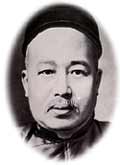The Threat of the Royalists (Bao Huang Dang
±£»Êµ³)

|
|
Kang Youwei
|
After the failed 100-Day Reform Movement of October 26 1898, its instigators, Kang Youwei (1858 - 1927) and Liang Qichao (1873 - 1929), had to flee for their lives.
Escorted by Miyazaki Toten and Hirayama Chikashi to Tokyo, they were approached by Dr Sun who thought they had similar goals in saving China. Kang refused to see Sun as he felt it was inappropriate for the Emperor's teacher to consort with a revolutionary. Two days later, Sun sent Chen Shaobai instead. Chen pushed for a total eradication of the Qing dynasty but Kang insisted that the emperor was wise and would be restored soon. Plans to cooperate fell through.
On March 2 1899, Miyazaki Toten acted as middleman to get both parties to cooperate. Kang had no plans to cooperate with Sun as he was still a keen supporter of Emperor Guangxu. Liang Qichao expressed interest but backed out when Sun tried to meet him.

|
|
Liang Qichao
|
In early August 1899, Liang Qichao met up with Sun to discuss their plan to cooperate. They agreed to combine efforts and Dr Sun was to become President and Liang the Vice-President upon their success. After their meeting, Liang reported the proceedings to Kang who was in Singapore. Kang was infuriated and ordered Liang to return to Honolulu immediately to manage the "Royalists". Their plans for cooperation fell through once again.
Liang Qichao associated frequently with Sun in Japan, and was torn between the ideologies of the "Royalists" and the Revolutionaries. He was agreeable to their collaboration but his decision was constantly shaken by the tough stance of his
mentor Kang Youwei. On December 19£¬1899, Liang sought a recommendation letter from Sun before he left for Honolulu. Unsuspectingly, Sun wrote a letter to his brother Sun Mei and other overseas Chinese businessmen. Due to the letter, Liang was received warmly in Honolulu, and he was able to raise a substantial amount of funds. He told them that the "Royalists" had the same mission as Sun's revolutionary group and managed to convert some members of "Revive China Society" to his "Royalist Society".
In June 1900, Dr Sun Yat Sen's Japanese friend Miyazaki Toten went to Singapore to visit his friend, Qiu Shuyuan. Kang Youwei was staying at Qiu's house at that time. However, in the midst of doing so, Miyazaki was accused of being a Qing government assassin after Kang's life. Miyazaki was then arrested by the colonial government in Singapore. Sun rushed to Singapore from Saigon (now Ho Chi Minh City) and sought help from his Singapore friends. Miyazaki was released later but the colonial government banned his return to Singapore.
From February to July 1902, Liang Qichao wrote a ten-thousand-word essay "Doctrine of the New Citizen" in his newspaper "New Citizen Journal", spouting ideas that blamed the decadence of the Qing dynasty on the ignorance of the common folk. Kang too published his article "A Debate with the Revolutionaries" in the same journal, criticising the revolutionary group for introducing French and American ideologies for no reason, causing internal strife. He felt that the Manchurians were relatively good rulers who had been in China for more than
two centuries. He said the revolutionary group was more harm than help. The opinions of the "Royalists" posed a tremendous threat to the revolution.
In late September, 1903, Sun went to Honolulu from Japan. When informed of his arrival, the Royalist's "New China Times" penned a slanderous article about the revolutionary group and Dr Sun's reputation. Sun used "The Hawaiian Chinese News" to rebutt those claims by publishing "A Declaration to My Fellow Chinese". In that article, Sun pointed out that the two factions had different goals and
were mutually antagonistic.
In Summer 1906, The Royalist Society changed its name to "Constitutional Monarchy Society" with the support of Manchu elites. Due to irreconcilable differences, Liang Qichao formed "Political News Society" with more than 200 members. On December 2 1906, during the anniversary celebrations of Min Bao, the official mouthpiece of the revolutionary group, Dr Sun addressed the audience on the "Three Principles of the People and China's
Future." His speech received a rapturous response from the audience, garnering generous donations. Later, Liang Qichao criticised the Principle of the People's Livelihood in the New Citizen Journal. The war of words between Liang and Min Bao lasted nearly a year. The Royalists' stance on a constitutional monarchy declined as time went by. On October 17, 1907, during its inaugural session in Tokyo, Zhang Ji led several members of the revolutionary group to sit in. When Liang mentioned the Emperor issuing an imperial edict to enforce constitutionalism, Zhang Ji and company marched up and disrupted the ceremony.
Dr Sun's toughest period of his revolutionary career - countless uprising failures, going on exile, losing his base of support and getting no results from his propagandising abroad - was between 1895 and 1900.
As Dr Sun expressed, "The royalists supported the corrupt even with knowledge of their (Qing) deceit. The royalists went against the revolution and objected to the formation of a republic. At that time, China was in the midst of darkness and despair."
In 1908, Emperor Guangxu and Empress Dowager Cixi passed away one after another and support for the royalists soon dwindled.
More stories to come...
|


